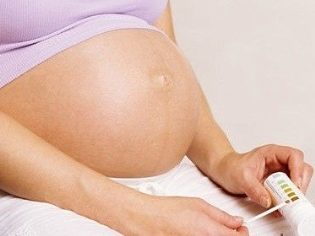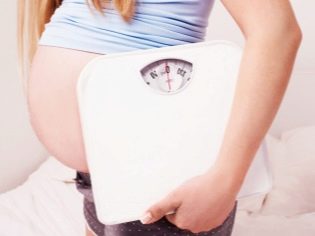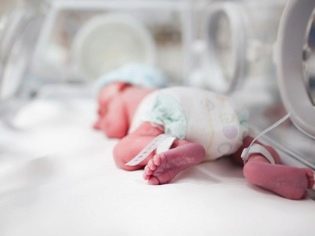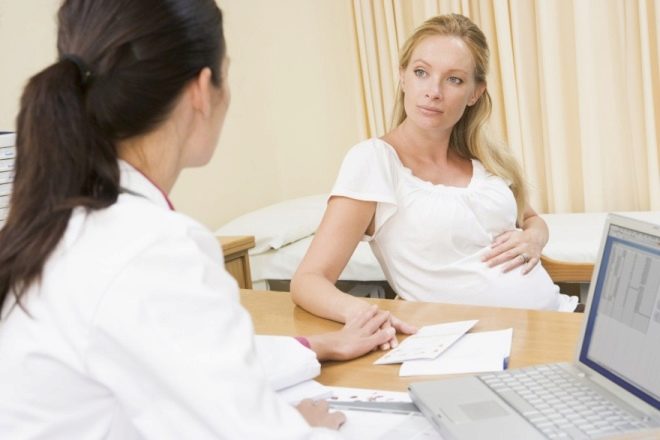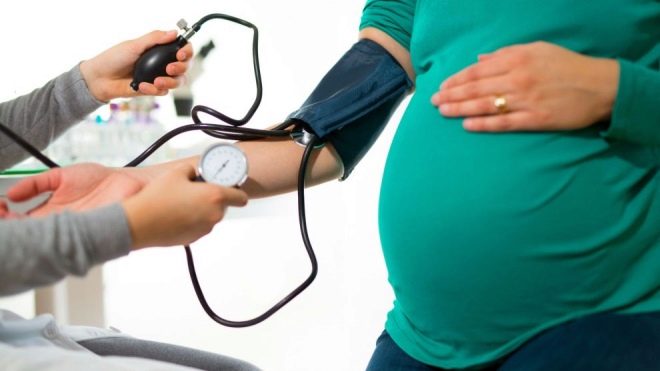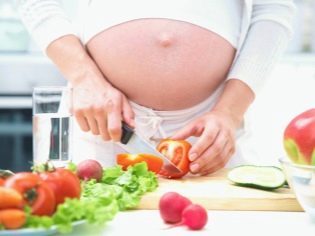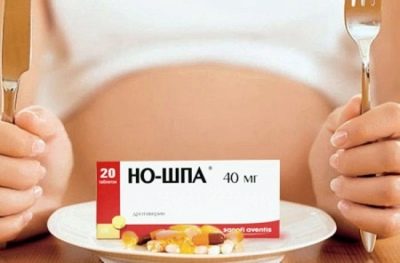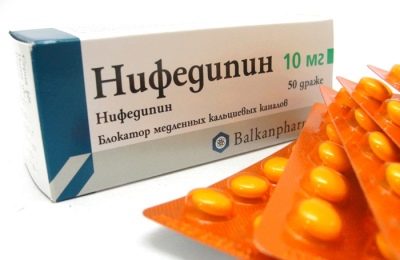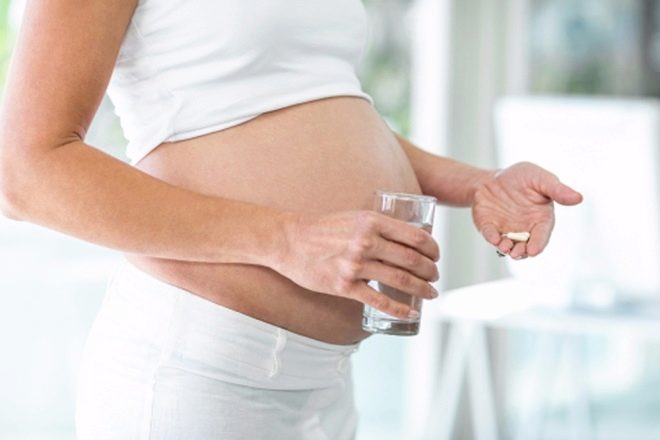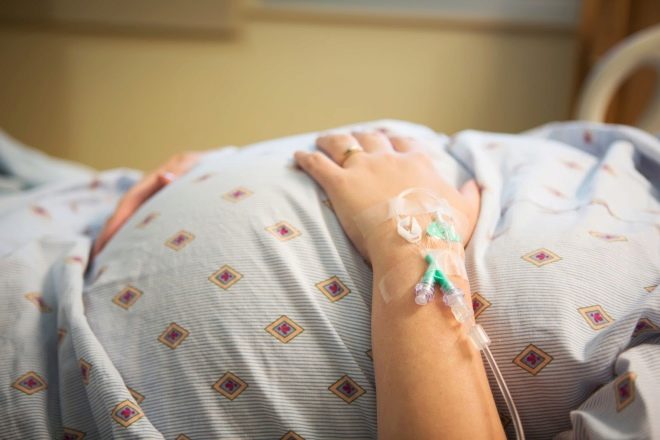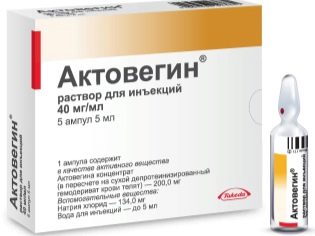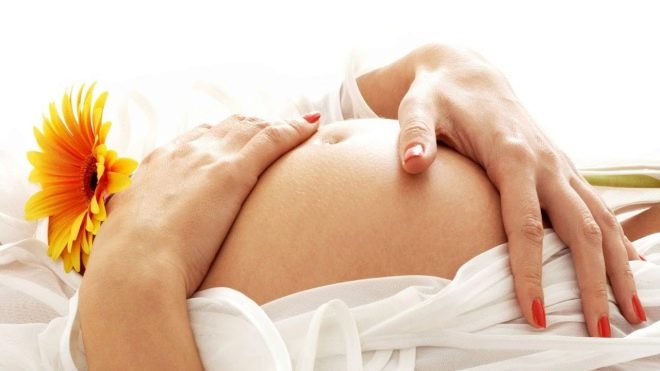How to reduce the pressure during pregnancy? Causes and effects of high blood pressure
Doctors pay special attention to the blood pressure of pregnant women. It is measured at each scheduled visit to the antenatal clinic and noted in the exchange card.
Elevated values cause well-founded anxieties both in the attending physician and in the woman herself. About why the pressure increases in future mothers and how you can safely reduce it, we will discuss in this article.
Causes of High Pressure
HELL - blood pressure in medicine is also called blood pressure. In essence, the value determined by the tonometer, recorded as a fraction, is nothing more than the force with which blood presses against the inner walls of blood vessels.
The first part of the fraction indicates the pressure force during the contraction of the heart (systolic pressure), and the second part indicates the diastolic pressure - the force with which blood presses against the vascular walls at the moment of heart relaxation.
The normal indicator for a healthy person is pressure, which does not exceed 110 (120) / 70 (80) millimeters of mercury. There are some women who have quite normal and natural is a pressure of 90/60 or 100/70. An obstetrician-gynecologist must be warned about this at the first visit to the consultation for registration. This will avoid confusion and confusion in the future.
Reasons to increase the pressure in pregnant women any number. First of all, such hypertension is associated with the fact that the amount of blood circulating through the vessels of a woman increases, because now you have to feed two living organisms at once.
This creates prerequisites for an increase in blood pressure, but not everybody’s real hypertension develops, but only those expectant mothers who have other “risk factors”:
- overweight, obesity;
- diseases of the heart and blood vessels;
- diabetes mellitus, including gestational (peculiar to pregnant women only) diabetes;
- genetic predisposition;
- hypertension, not caused by anything (an independent disease that is not associated with any pathologies in the body).
The risks of high blood pressure are in the vast majority of expectant mothers, who in previous pregnancies noted two or more facts of increasing blood pressure. There are several pathological reasons that can lead to such an unpleasant state.
Usually obstetrics deals with two main ones:
- Gestosis - complication of pregnancy, which is accompanied by increased pressure, the appearance of edema, the appearance of protein in the urine, and the development of seizures. A deadly condition for both women and children in need of medical care.
- Gestational hypertension - a condition in which there is increased pressure, and protein in the urine and cramps are not observed. In this case, the doctors do not ascertain preeclampsia, but designate the condition as hypertension of pregnant women. It usually begins after 20-22 weeks and passes on its own after childbirth.
Danger and consequences
The main danger of high blood pressure during pregnancy, if it is caused by preeclampsia, lies in the risk of developing various pathologies in the expectant mother. An alarming combination of the three main symptoms - swelling / pressure / protein in the urine does not just scare the attending physician.
Gestosis can cause a woman to develop kidney failure. Gestosis often affects the lungs, liver and heart. A woman may have problems with the activity of the nervous system.
With high pressure, the vessels are prone to spasms, this increases the likelihood of developing a thrombosis, there is a real risk of falling vision, there is a considerable likelihood of cerebral hemorrhages, the consequences of which can be the most sad, even death.
If preeclampsia is accompanied by nausea and vomiting, the likelihood of dehydration increases.
For a child, the risks are high too. The most dangerous consequences - placental abruption, development of placental insufficiency, fetal death of the baby. In about 10% of cases, preterm labor occurs with mild and moderate preeclampsia.
If preeclampsia has a more severe course, then the probability of having a baby before the obstetric period is 20%. If eclampsia begins, almost every third crumb appears ahead of time. Prenatal death of babies with gestosis in the later periods is estimated by severe medical statistics at 35%.
If the state of preeclampsia is long-lasting, and the disturbances proceed sluggishly, the child almost always experiences a state of hypoxia, lack of oxygen, which cannot but affect its development, the work of the central nervous system.
Every third child, who is born to a woman with such a long preeclampsia, is underweight, lags behind in development, later on he may experience significant delays in physical and intellectual development.
If the pressure gets too high, preeclampsia goes into eclampsia, then a woman is trying to give birth to urgentlywithout waiting for the right time. At the same time, the baby is not always physically ready for independent life outside of her mother's belly. Births in women with preeclampsia are more severe, and the early postpartum period may be complicated by heavy bleeding.
Gestational hypertension is not as dangerous as classic preeclampsia, but it is also alarming. Due to the increased pressure in a woman, the blood flow in the uterine vessels is disturbed, which is why the development of fetoplacental insufficiency is likely. Usually it is quite possible to fight with such a violation with supportive therapy and to keep the pregnancy until the time when it will be possible to give birth to a woman without the risk of losing the baby.
Such a violation that most often appears after 20-22 weeks, accompanies the pregnant for the rest of the gestation period. It requires more careful monitoring, monitoring of blood pressure and treatment.
If hypertension is caused by chronic diseases of the kidneys, adrenal glands and the heart before pregnancy, an elevated level of blood pressure is a companion of pregnancy already in the early stages. This also requires medical correction and special tactics for managing pregnancy.
Symptoms
Sometimes the increase in pressure in the expectant mother is not accompanied by any symptoms, and may go unnoticed. In any case, until the moment when the complications begin. That is why an obstetrician-gynecologist so often measures the pressure of a pregnant woman and controls its dynamics. In some cases, the following signs may indicate an increase in pressure:
- the appearance of intense headache (the higher the pressure, the stronger the pain, the sensation of pressure in the temples);
- dizziness, tinnitus;
- oppressive sensation in the eyeballs, perhaps the subjective sensation of "flies before the eyes";
- weakness, nausea, sometimes - vomiting;
- redness of the skin in the face and décolleté.
Even if there are no signs of hypertension, this does not mean that all the above risks for the mother and child are absent. Risks and dangers do not diminish in the absence of clinical manifestations, and therefore doctors try to identify future mothers at risk as soon as possible and try to reduce possible risks of negative consequences to a minimum.
What pressure is considered high
For a woman whose natural pressure is always low, for example makes 90/60 or 100/70, it is possible to consider as increased 120/85. Normal for most people, tonometer readings will be considered normal for abnormal hypotonia.
If the expectant mother's usual pressure is in average values, then 135-140-150 and higher in systole and 90-100-110 in diastole will be considered elevated..
A high pulse at normal pressure is not considered dangerous for the life of the mother and fetus. Usually, exceeding the norm of 90-100 beats per minute can be associated with stress, with anxiety. If the arrhythmia is not associated with thyroid problems, then there is absolutely nothing to worry about.
Sometimes only the lower pressure, that is diastolic, is increased. Sometimes it is called renal, because indirectly it indicates the work of the kidneys.
If it is the lower part of the HELL fraction that is elevated, then doctors may suspect the future mother of kidney problems, heart disease, and the presence of tumors.
Features of pressure during pregnancy
Since the organism of the future mother works according to its own laws, and the load on all organs and systems literally from the first days of the “interesting position” increases, this cannot but affect the level of blood pressure. So, when assessing the level of blood pressure in a female consultation, doctors always make small “deviations” from the rules, laying some error in the testimony of the tonometer.
In the first trimester and at the beginning of the second, the blood pressure on the walls of the blood vessels in the body of the expectant mother is somewhat reduced. The permissible fluctuation of the upper (systolic) pressure in this case is no more than 15 mm Hg, and the lower (diastolic) pressure is no more than 10 mm.. This is due to normal physiological causes, and the disease is not considered. The case in the hormone progesterone, which is produced to save the baby. Simultaneously with the main function, it somewhat relaxes the walls of blood vessels, due to which the pressure decreases.
As pregnancy develops in the second half of the second trimester and in the third trimester, the pressure increases slightly, by about the same values due to a significant increase in the amount of circulating blood. Thus, the pressure at the end of pregnancy comes to the usual, familiar to the woman mark.
If the pressure rises above normal values, and such increases are systematic and prolonged, doctors examine the woman for preeclampsia.
At risk of the likelihood of developing hypertension and preeclampsia are women who are overweight, “age-related” moms (over 35), pregnant women who are too young (under 18), and women who carry several babies - twins or triplets.
Ways to reduce pressure - treatment
Hypertension during pregnancy necessarily needs treatment. Moreover, treatment should begin immediately, as soon as the reason for the increase in blood pressure values is found.
If the pressure rises due to chronic diseases, for example, pathology of the kidneys or the heart, the gynecologist must come to the aid of a doctor of another specialty — a nephrologist or a cardiologist.
If the reason for the violation of the thyroid gland, then you can not do without consulting an endocrinologist.
In any case, the treatment will be complex. It will include medical methods and methods that will reduce the pressure without pills and injections. We will tell about these methods in more detail.
General recommendations
To reduce the pressure during pregnancy will help the correct approach to lifestyle. A woman should definitely get enough sleep at night you should spend at least 9-10 hours, while you should find 1-2 hours during the day to lie down and take a nap.
If a woman cannot afford such a regimen (she works even before maternity leave is far away), the doctor can give direction to the day hospital or to the hospital of the department of pathology of pregnant women.
A woman should limit stress and psychological situations that traumatize her. Unpleasant communication should be reduced to a minimum; you should not take everything to heart.
Heavy physical activity is also contraindicated. If the main labor activity is connected with them, a woman can be given a medical order with a demand to change the mode of work that she presents to her employer.
Pedestrians are needed and helpful. walks in the fresh air, leisurely pace, at least 30-50 minutes a day. Staying in rooms where it is smoky, stuffy or smoky, should be excluded altogether, as well as the reception of hot baths.
The right approach to nutrition is another important condition for successful treatment. Products should not contain large amounts of salt. A woman is allowed no more than 5 grams of salt per day. It is better if it is saturated with potassium. Therefore, the products that can and should be taken at elevated pressure are bananas, dried apricots, raisins, sea kale and salads from it, as well as baked potatoes along with the peel.
Woman desirable control your blood pressure twice a day, measure it with a tonometer at home in the morning and evening and record the results in order to show the dynamics to the doctor at the next appointment.
By the way, such pregnant women will have to go to the consultation more often than others. They will be invited at least 1 time in 2 weeks, with each visit will be mandatory delivery of urine to determine the protein in it.
If the increased pressure is accompanied by edema, the woman should be more attentive to the drinking regime. Record the amount of fluid you drink (including soups), count the amount of fluid you have emitted, avoid salty and spicy foods, carbonated drinks, long standing or sitting in one position.
Medicines
When choosing medicines, the main requirement is safety for the pregnant woman and the child who grows and develops in her womb. There are not so many such means that effectively lower blood pressure on the vessels and at the same time do not have an effect on the child.
If the pressure rises slightly, and these rises are not of a long-term nature, the doctor may limit the prescription of herbal preparations that have a slight sedative effect. Such drugs include “Motherwort”, “Valerian” tablets, “Novopassit”, “Persen». Mandatory condition for recovery - compliance with all recommendations for the correction of lifestyle.
Quite often, pregnant women are prescribed the well-known “No-shpu”. This yellow antispasmodic, which every pregnant woman often has in her purse, not only removes the tone of the uterine walls, but also lowers the pressure due to the fact that it relaxes the blood vessels.
If the level of blood pressure is high enough and the rises are frequent and prolonged, other drugs will be prescribed to the woman.
Most often, pregnant women are prescribed "Dopegit". This antihypertensive agent with the main active ingredient methyldopa sesquihydrate lowers the pressure to pregnant women in the early stages and in the second trimester. You can drink the drug for up to 28 weeks.
One dose of the drug allows you to reduce the pressure after 4-4.5 hours, and the effect lasts from 12 hours to a day.
The active substance, accumulating in the blood, is able to penetrate the placental barrier, but does not harm the fetus. This is confirmed by clinical trials published on the official website of the manufacturer.
Due to the lack of sufficient clinical data on the effect of the drug on the child in the third trimester, it is recommended to prescribe the drug only in the first and second. But manufacturers emphasize that the condition of children whose mothers took the medicine in the last months of gestation was much better than the condition of babies whose mothers with gestosis in the later periods refused to take the drug.
The doctor should count the dose of the drug, any attempts to calculate it yourself are categorically contraindicated. This rule applies to all drugs that belong to the pharmacological group of antihypertensive drugs.
Calcium channel blocker drugs have been widely used during pregnancy. These include "nifedipine". The effect of "Nifedipine" comes after 20 minutes, and the action lasts for almost a day.
Available in conventional tablets and long-acting tablets, which can reduce the number of doses of the drug to one per day in the prescribed dosage.
Unfortunately, the drug manufacturers did not conduct sufficiently convincing clinical trials to judge the safety of the drug during pregnancy. They honestly indicate that the studies were carried out only on animals, and at the same time they showed signs of toxicity to the embryo, the fetus. Judging the implications for the human cub on the basis of such tests is unethical and wrong.
A drug in the first trimester try not to appoint. Usually, if necessary, if pressure cannot be reduced by other means, the drug used with great care and only under medical supervision.
Another group of prescribed drugs - beta-blockers. They reduce the frequency and strength of heart contractions, which causes a completely natural decrease in blood pressure.
"Adrenolol" allows you to immediately reduce both systolic and diastolic pressure. The heartbeat is more rhythmic, calm.
In the first trimester, the drug is not prescribed, because it can penetrate the placental barrier, causing slowing fetal heartbeat. The tool is used to reduce pressure in the later periods, especially at 36-39 weeks, but exclusively under medical supervision and for health reasons, when the potential harm from the drug does not exceed the harm to the child’s condition, if the pressure remains high.
Drugs in this group require careful observation not only of the condition of the expectant mother, but also monitoring the condition of the child, so it is best to conduct treatment in a hospital where there is always the opportunity to do CTG or ultrasound.
Conducting childbirth also requires medical support. With a high pressure in a woman, doctors often decide to have a cesarean section for a period of 38-39 weeks or earlier, if the condition of the fetus qualifies as unsatisfactory.
Even if natural childbirth is allowed, they are tried to be carried out with the use of epidural anesthesia, which not only anesthetizes, but also reduces blood pressure in the labor process.
Folk remedies
Increased pressure in the period of carrying a child is dangerous. Therefore, the use of folk remedies to solve this problem is not the best solution, which can have serious consequences. Therefore, hypertension is the case when you should still consult your doctor before using any prescription from the arsenal of alternative medicine.
Recipes based on the strength of medicinal herbs and the benefits of berries and fruits are considered the safest. So, a woman can brew herself a weak plant herbal tea from pharmaceutical chamomile flowers, from mint leaves, fennel and valerian root. You can combine motherwort, chamomile and dill seeds. Teas brew before each use, drink warm.
Useful natural birch sap.This is a real juice extracted from the trunks of these trees, and not a clear sweet liquid with sugar, which is sold in stores.
If the season, and opportunities allow, it is better to buy natural juice or get it yourself. Cranberry and pomegranate juice, beet juice, lingonberry juice and mixed carrot-apple juice are also considered useful for reducing pressure.
Well reduces the pressure of the juice, which can be squeezed out of the berries of mountain ash. It takes only a few teaspoons per day. But overdosing with such a remedy can cause diarrhea, therefore care must be taken. In small quantities useful red tea hibiscus, black chokeberry.
In folk medicine, there are many prescriptions for reducing pressure, based on bee products and alcohol, making such tinctures and taking them during the period of carrying a baby is not worth it, these recipes can be tested after giving birth and ending breastfeeding, if necessary.
Reviews
For many pregnant women, treatment begins with the appointment of the drug "Dopegit." It is about him that future mothers in special women's forums leave the most feedback. According to women, the drug helps, but after the end of the course of treatment, the pressure usually returns, especially after 20 weeks.
Inpatient treatment courses are significantly more effective.when the necessary drugs women receive injections and drip intravenously.
Many future mothers indicate that they were helped by droppers with "Actovegin"Painful but useful injections of Magnesia."
Folk remedies, although they are widely used, quite often lead to the fact that a woman still has to start treatment with medicines. Among the popular recipes moms recommend hawthorn fruit tea, a decoction of cowberry leaves, homemade cranberry juice.
Prevention of hypertension in pregnant women
To avoid the reappearance of high blood pressure values, as well as to prevent them altogether, a correct lifestyle will help, in which a woman in an “interesting position” will have enough time to sleep, to rest. Physical and emotional overload should be reduced, and in the diet should be added more useful and high-quality products with a high content of vitamins, especially vitamin C.
Strong tea and coffee, any alcoholic beverages during pregnancy (and better at the planning stage) are best eliminated and replaced with warm herbal tea and natural fruit and berry juices. Canned food, smoked products, salty foods should be excluded, and fresh vegetables and lean meat and fish are very useful.
Woman should control her weightto prevent it from over-typing. It is important to be able to control your own pressure at home and do it at least once or twice a day. Modern tonometers allow you to do this with ease and without outside help. It is important to measure pressure on two hands.If the indicators on the left differ from those on the right (by 5-10 mm Hg), then this may be the first symptom of a predisposition to the development of preeclampsia and a reason for unplanned treatment to the doctor.
You should not refuse hospitalization if it is offered by the doctor. Usually they try to put pregnant women in hospital who have signs of preeclampsia in the early stages, up to 12-14 weeks.
The second “dangerous” period, in which it is also desirable to lie in hospital under the supervision of doctors, is the period before going on maternity leave - from 28 to 32 weeks. It is at this time that the volume of circulating blood increases dramatically, and the manifestations of hypertension may increase.
A woman prone to high blood pressure should receive treatment with approved drugs in prophylactic doses during this period.
The future mother will also have to go to the maternity hospital a little earlier than the others - at 38-39 weeks of pregnancy she must come to the chosen obstetric hospital so that she can be prepared for delivery in advance or decide to have a cesarean section.
A pregnant woman can be hospitalized at any time and at any time if she has experienced a sharp rise in blood pressure, if her state of health has worsened.
It is not necessary to write a waiver of hospitalization, because the right measures taken on time can save lives and health for both mother and child.
About what to do pregnant with elevated pressure, see the following video.



